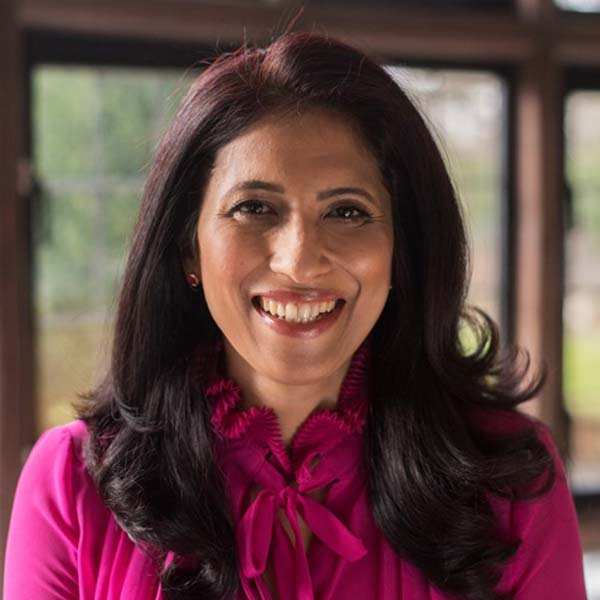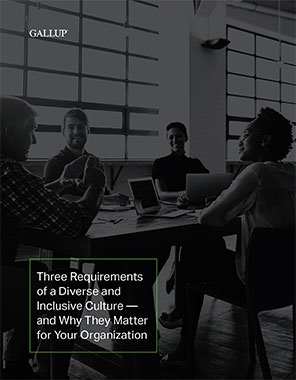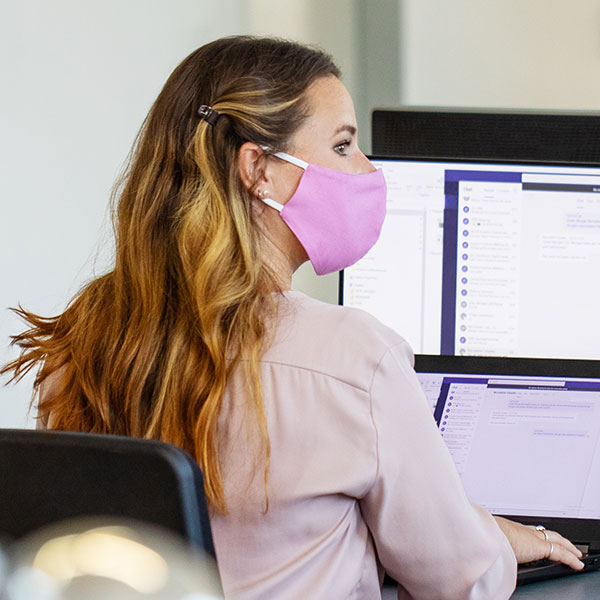A Conversation With Leena Nair

Leena Nair
Chief Human Resources Officer for Unilever
Unilever, the company behind some of the world's biggest brands -- Dove, Ben & Jerry's, Bovril, Vaseline and Lipton, to name a few -- is also one of the world's most socially conscious companies. In 2019, Unilever scored a best-in-class rating on S&P Global Rating's Environmental, Social and Governance (ESG) Evaluation, 90 out of 100 in the 2020 S&P Dow Jones Sustainability Index, and in 2019 achieved 100% renewable energy across five continents. When Unilever wants to make something happen, it happens.
Now Unilever wants to make something better happen for young, underprivileged and underrepresented groups of people. "We've reached the tipping point on climate change but not on social inequality," says Unilever CHRO Leena Nair. "As a company we need to create more jobs, ensure people from underrepresented communities get those jobs, and pay the people in those jobs a living wage."
To that end, Unilever has committed to eight ambitious, socially conscious goals. As Nair describes in the CHRO Conversation below, sustainable business is the right investment for organizations to make because it drives superior performance through growth and productivity: "When you build a better business, you create a better world. But when you create a better world, you build a better business too."
Emond: The last time I traveled was a year ago today, to the CHRO Roundtable you hosted in London. How have you been holding up since then?
Nair: You know, it's been the most stretching but fulfilling year of my career because everything we're doing is making a difference to people and the business. But it's sort of soul destroying too, because I miss people. I miss the one-on-one connection to human beings and really crave that in-person time we used to spend together as a team.
Emond: Knowing you, I'm not surprised. And knowing you, you've made a huge difference for people and Unilever anyway. Tell me about Unilever's social equality commitments.
Nair: Two of the most pressing issues of our time are climate change and social inequality. We've reached the tipping point on climate change but not on social inequality. There are 660 billionaires in the U.S. who added $1.4 trillion to their wealth last year, as 20 million Americans lost their jobs. The divide between rich and poor got wider. After two decades of progress, we have gone backwards on world poverty. And, as a company, we decided social inequality needs to reach a tipping point too. So, we announced eight social commitments under three pillars: raising living standards, creating opportunities through inclusivity, and preparing people for the future of work.
Emond: All at once?
Nair: Yes, because I don't believe you can solve for only one problem at a time. If you pay living wages to everyone, which is one of our commitments, what if someone then loses that job? That's why we connected living wage, inclusion and skills -- it's a systemic answer. As a company, we need to create more jobs, ensure people from underrepresented communities get those jobs, and ensure the people in those jobs earn a living wage.
Emond: Tell me about the commitments.
Nair: Under raising living standards, we have two big goals. The first is that everyone who directly provides goods and services to Unilever will earn at least a living wage or income by 2030.
Two of the most pressing issues of our time are climate change and social inequality. We've reached the tipping point on climate change but not on social inequality.
Emond: How much will that cost?
Nair: It's too early for us to give an estimate. The full cost of the commitment is dependent on a range of factors, including the country we are operating in, the goods or services purchased, and the level of the intervention needed. It will also depend on country legislation, industry approaches and partnerships where we hope to leverage a more systemic approach and drive greater efficiencies. We estimate this will impact about 10 million people between our employees, suppliers and their families -- it's too early to put a number on the positive impact a living wage or income will have on individual workers as well as their families and communities.
Emond: Theoretically, that will make your products more expensive.
Nair: It's our belief that paying a living wage will help the virtuous ecomonic cycle of greater growth, productivity, efficiencies and retention. When people have more spending power, they are able to buy more goods and services. They spend more on every business. And when the economy grows, businesses grow.
Emond: So with that pillar, you're impacting 10 million people at least. That's incredible reach, Leena.
Nair: That's just the first element. The second commitment under the raising living standards pillar is to help 5 million small and medium-sized enterprises, or SMEs, to grow their business through access to skills, finance, and technology by 2025. Most of these SMEs are retailers who run independent stores, outlets and kiosks, or micro-entrepreneurs selling products house-to-house or on the street. When they grow their business, they will create jobs, and more jobs is good for the world.
Emond: What kind of skills will you provide to SMEs?
Nair: So think about mom-and-pop store owners who buy our products but haven't changed their technology. They need to be able to compete with online retailers, so we're working with them to digitize their stores to inventorize, to start delivery to households nearby, to manage their finances, so that they can become future-fit businesses to compete with online platforms in small and large markets.
Emond: Are your "Discover Your Purpose" workshops part of this?
Nair: Yes, because we have to work on mindset as much as the skill-and-will equation. All the literature around the fourth industrial revolution and its impact on jobs is so negative, yet there are tons of courses available on the internet. Does that mean everyone's learning like crazy? Of course not. So even as we're providing lots of course content, we've got to provide the motivation, inspiration and the mindset to learn and embrace change. So we've put 60,000 of our people through the "Discover Your Purpose" Workshops to think about the crucible moments that defined them, what they're passionate about, and what they want to get done in this world. Thinking about the times they've been the most miraculously effective in their lives shows them a beautiful combination of their strengths and their motivations. More and more data is coming out now -- the London Business School is doing a piece of work on it -- finding that the workshop changes motivation. Unilever's engagement scores have gone through the roof, because people who've gone through the workshop and feel they're living their purpose at Unilever report higher intrinsic motivation and express a higher satisfaction with life. Just our scores on "pride" are in the 90s, so we're beginning to see the benefits of this.
Emond: Which brings me back your commitments. How are you increasing inclusivity?
Nair: That's also exciting. One way to achieve an equitable culture is through policies and practices -- and in a company our size there are hundreds and thousands of policies from recruitment to retirement -- that eliminate bias and discrimination. The second commitment is to include more people from diverse groups in Unilever advertisements, both on screen and behind the camera. For example, 15% of the world's population have a disability and in 2019, only 2% of ads included people with a disability. Two and a half billion consumers use our products every day, so we have enormous scale of influence. The third commitment under creating opportunities through inclusivity is that we will spend €2 billion annually with suppliers managed and controlled by people from diverse and underrepresented groups.
So, raising living standards, creating opportunities through inclusivity, and preparing people for the future of work is necessary for people. But it's necessary for businesses too.
Emond: How do you define underrepresented?
Nair: That includes women, underrepresented racial and ethnic groups, excluded groups relevant to that country, people with disabilities, and people from the LGBTQ+ community. At the same time, we're launching a supplier development program to help ensure our suppliers' success.
Emond: That's the three commitments around creating opportunites for inclusion. Now tell me about preparing people for the future of work.
Nair: I really believe you've got to give people the skills to survive the future of work or they're not going to find jobs. And we believe the traditional models of employment, in which everyone comes into the office 40 hours a week at the same company for 40 years, are outdated. So our three big commitments include reskilling or upskilling our employees with a future-fit skillset that will be audited and verified by an external party by 2025. The second is we are pioneering new employment models that will provide all our employees with choice through flexible employment options by 2030. Finally, we're preparing people for the future of work by equipping 10 million young people with essential job skills by 2030.
Emond: How do you plan to do that? And how do you select those young people?
Nair: Identifying young people is no problem at all. Two million people apply to Unilever every day and I'm only able to hire 10,000 of them. I'm rejecting 99.5% of the people who apply to Unilever. Preparing them is a different story. We've started with an experiment in South Africa, a digital platform called Level Up that offers skills-based courses. Hard skills, soft skills, online workshops to discover your purpose, improve your communication skills, how to build your personal brand, introduction to data analytics -- just a plethora of fantastic course content available for young people. But because we believe you get equipped when you get experiences, we opened this platform to our suppliers and customer ecosystem so they can offer internships and apprenticeships to these young people too. For instance, one of our big partners in South Africa is Smollan, who supports us with merchandising, and they can post their jobs on this platform too, so even more young people can get the skills or find the employment opportunities they need.
Emond: Is this solely a Unilever development?
Nair: Oh no, absolutely not. We developed Level Up in conjunction with loads of partners -- Microsoft is part of it, Pearson and LinkedIn are part of it -- because we want businesses to collaborate to eliminate social inequality. One business can't do it. But when one company makes a commitment, and another one follows, and another one after that, before you know it, you've got momentum. We saw that with climate change and it's what I want happening on social inequality. So if Unilever reaches 10 million people, somebody else another 10 [million], some other company reaches another 30 [million], very soon those businesses have significant impact around the world.
Emond: And all of this skilling is free.
Nair: All of that skilling is free. All of the opportunities, some are paid, some are unpaid, but all of the opportunities are out there to help people build skills and find their way to job opportunities.
Emond: How does Unilever benefit? Or does it?
Nair: You know Larry, Unilever needs close to half a million people for front-line jobs every year. That's just us -- our suppliers and distributors have huge numbers of unfilled positions, too. By ensuring the training for those jobs and increasing consumers' purchasing power, we as a business benefit. So, raising living standards, creating opportunities through inclusivity, and preparing people for the future of work is necessary for people. But it's necessary for businesses too. Sustainable business delivers superior performance. One of our fundamental beliefs is business has to be a force for good in the world. And that when you build a better business you create a better world -- but when you create a better world, you build a better business too.
Explore other CHRO conversations:
- Alimentation Couche-Tard CPO/CHRO Ina Strand
- Novartis CHRO Steven Baert
- Philips CHRO Daniela Seabrook
- Thermo Fisher Scientific CHRO Lisa Britt
- IBM CHRO Nickle LaMoreaux
- Standard Chartered Bank Group Head of Human Resources Tanuj Kapilashrami
- Zurich Insurance Group CHRO David Henderson
- AT&T CHRO Angela Santone
Jennifer Robison contributed to this article, which was based on an interview conducted by Larry Emond.





